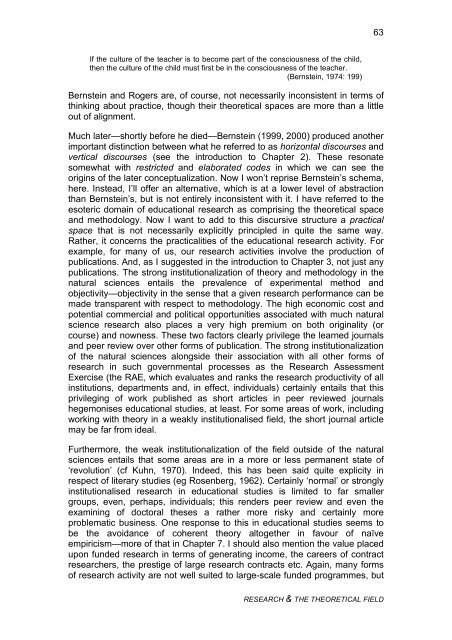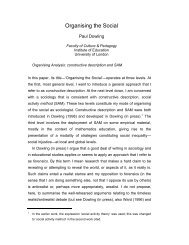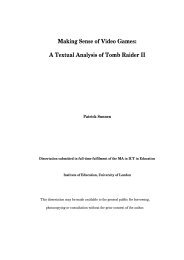Research and the Theoretical Field - Pauldowling.me
Research and the Theoretical Field - Pauldowling.me
Research and the Theoretical Field - Pauldowling.me
Create successful ePaper yourself
Turn your PDF publications into a flip-book with our unique Google optimized e-Paper software.
63<br />
If <strong>the</strong> culture of <strong>the</strong> teacher is to beco<strong>me</strong> part of <strong>the</strong> consciousness of <strong>the</strong> child,<br />
<strong>the</strong>n <strong>the</strong> culture of <strong>the</strong> child must first be in <strong>the</strong> consciousness of <strong>the</strong> teacher.<br />
(Bernstein, 1974: 199)<br />
Bernstein <strong>and</strong> Rogers are, of course, not necessarily inconsistent in terms of<br />
thinking about practice, though <strong>the</strong>ir <strong>the</strong>oretical spaces are more than a little<br />
out of align<strong>me</strong>nt.<br />
Much later—shortly before he died—Bernstein (1999, 2000) produced ano<strong>the</strong>r<br />
important distinction between what he referred to as horizontal discourses <strong>and</strong><br />
vertical discourses (see <strong>the</strong> introduction to Chapter 2). These resonate<br />
so<strong>me</strong>what with restricted <strong>and</strong> elaborated codes in which we can see <strong>the</strong><br />
origins of <strong>the</strong> later conceptualization. Now I won’t reprise Bernstein’s schema,<br />
here. Instead, I’ll offer an alternative, which is at a lower level of abstraction<br />
than Bernstein’s, but is not entirely inconsistent with it. I have referred to <strong>the</strong><br />
esoteric domain of educational research as comprising <strong>the</strong> <strong>the</strong>oretical space<br />
<strong>and</strong> <strong>me</strong>thodology. Now I want to add to this discursive structure a practical<br />
space that is not necessarily explicitly principled in quite <strong>the</strong> sa<strong>me</strong> way.<br />
Ra<strong>the</strong>r, it concerns <strong>the</strong> practicalities of <strong>the</strong> educational research activity. For<br />
example, for many of us, our research activities involve <strong>the</strong> production of<br />
publications. And, as I suggested in <strong>the</strong> introduction to Chapter 3, not just any<br />
publications. The strong institutionalization of <strong>the</strong>ory <strong>and</strong> <strong>me</strong>thodology in <strong>the</strong><br />
natural sciences entails <strong>the</strong> prevalence of experi<strong>me</strong>ntal <strong>me</strong>thod <strong>and</strong><br />
objectivity—objectivity in <strong>the</strong> sense that a given research performance can be<br />
made transparent with respect to <strong>me</strong>thodology. The high economic cost <strong>and</strong><br />
potential com<strong>me</strong>rcial <strong>and</strong> political opportunities associated with much natural<br />
science research also places a very high premium on both originality (or<br />
course) <strong>and</strong> nowness. These two factors clearly privilege <strong>the</strong> learned journals<br />
<strong>and</strong> peer review over o<strong>the</strong>r forms of publication. The strong institutionalization<br />
of <strong>the</strong> natural sciences alongside <strong>the</strong>ir association with all o<strong>the</strong>r forms of<br />
research in such govern<strong>me</strong>ntal processes as <strong>the</strong> <strong>Research</strong> Assess<strong>me</strong>nt<br />
Exercise (<strong>the</strong> RAE, which evaluates <strong>and</strong> ranks <strong>the</strong> research productivity of all<br />
institutions, depart<strong>me</strong>nts <strong>and</strong>, in effect, individuals) certainly entails that this<br />
privileging of work published as short articles in peer reviewed journals<br />
hegemonises educational studies, at least. For so<strong>me</strong> areas of work, including<br />
working with <strong>the</strong>ory in a weakly institutionalised field, <strong>the</strong> short journal article<br />
may be far from ideal.<br />
Fur<strong>the</strong>rmore, <strong>the</strong> weak institutionalization of <strong>the</strong> field outside of <strong>the</strong> natural<br />
sciences entails that so<strong>me</strong> areas are in a more or less permanent state of<br />
‘revolution’ (cf Kuhn, 1970). Indeed, this has been said quite explicity in<br />
respect of literary studies (eg Rosenberg, 1962). Certainly ‘normal’ or strongly<br />
institutionalised research in educational studies is limited to far smaller<br />
groups, even, perhaps, individuals; this renders peer review <strong>and</strong> even <strong>the</strong><br />
examining of doctoral <strong>the</strong>ses a ra<strong>the</strong>r more risky <strong>and</strong> certainly more<br />
problematic business. One response to this in educational studies seems to<br />
be <strong>the</strong> avoidance of coherent <strong>the</strong>ory altoge<strong>the</strong>r in favour of naïve<br />
empiricism—more of that in Chapter 7. I should also <strong>me</strong>ntion <strong>the</strong> value placed<br />
upon funded research in terms of generating inco<strong>me</strong>, <strong>the</strong> careers of contract<br />
researchers, <strong>the</strong> prestige of large research contracts etc. Again, many forms<br />
of research activity are not well suited to large-scale funded program<strong>me</strong>s, but<br />
RESEARCH & THE THEORETICAL FIELD




